Dental nurse exams assess clinical skills and knowledge. Q&A resources, such as Carole Hollins’ guides, offer structured exam prep, enhancing understanding and confidence for aspiring dental professionals.
Importance of Questions and Answers for Dental Nurses
Questions and answers are vital for dental nurses to master exam formats and clinical scenarios. They provide structured learning, covering topics like infection control and patient communication. Carole Hollins’ Q&A guides offer detailed explanations, helping nurses understand complex concepts. Affordable PDFs and mock tests enhance preparation by simulating real exams. These resources identify knowledge gaps, improve time management, and build confidence. Regular practice with Q&A materials ensures familiarity with question types, such as MCQs and EMQs. They also promote continuous learning, keeping nurses updated on industry changes. Effective use of Q&A resources is essential for success in the NEBDN National Diploma and beyond, ensuring dental nurses are well-prepared for their professional roles.
Overview of the NEBDN National Diploma
The NEBDN National Diploma is a comprehensive qualification for dental nurses. It has evolved from the National Certificate, now including Single Best Answer (SBA) and Extended Matching Questions (EMQs). Resources like Carole Hollins’ Q&A guides align with these changes, offering detailed explanations for complex topics. The diploma covers essential areas such as infection control, patient assessment, and dental radiography. It reflects advancements in dental nursing education and prepares professionals for modern healthcare challenges. The updated exam format ensures dental nurses are proficient in clinical skills and theoretical knowledge. This diploma is a cornerstone for career progression, emphasizing continuous learning and adaptability in the field.
Key Topics Covered in Dental Nurse Exams
Dental nurse exams cover a wide range of topics, including infection control, patient assessment, and dental radiography. These exams also address pharmacology and anesthesia, ensuring comprehensive understanding. Resources like Q&A guides provide detailed explanations for complex topics, aiding in exam preparation. The exams are designed to test both clinical skills and theoretical knowledge, ensuring dental nurses are well-prepared for real-world challenges. By focusing on these key areas, dental nurses can confidently approach their exams and excel in their roles. Effective study materials, such as Carole Hollins’ guides, help candidates master these topics, ensuring success in their dental nursing careers.
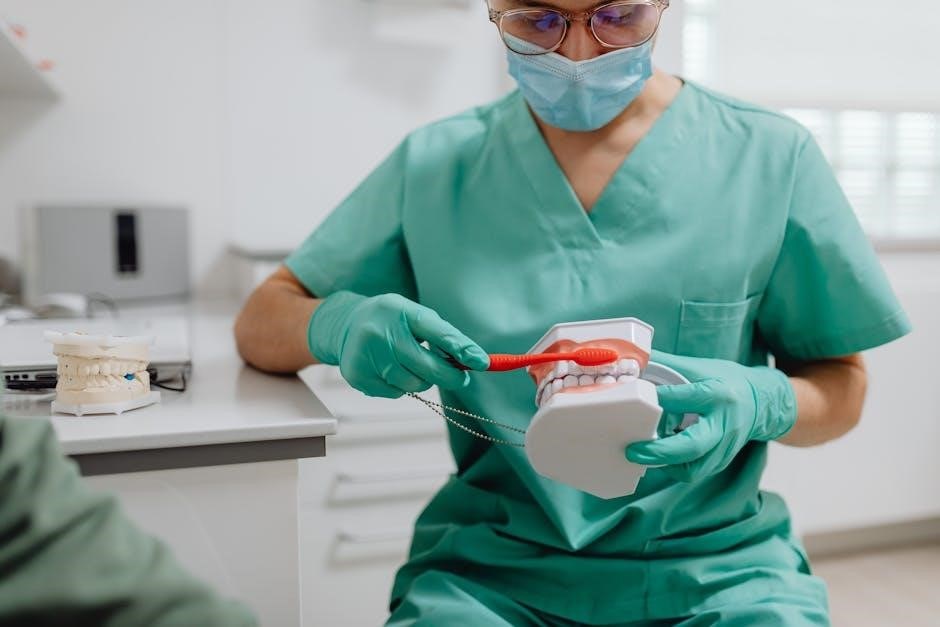
Popular Resources for Dental Nurse Preparation
Carole Hollins’ Q&A guide and affordable PDFs are essential for exam preparation. These resources offer comprehensive Q&As, MCQs, and EMQs, covering infection control and professional development effectively.
Carole Hollins’ Questions and Answers for Dental Nurses
Carole Hollins’ updated third edition provides comprehensive Q&As for dental nurse exams, including multiple-choice and extended matching questions. It covers essential topics like infection control and professional development, aiding candidates in understanding exam formats and improving their clinical knowledge. The book reflects changes in the NEBDN National Diploma, ensuring relevance for modern dental nursing education. With detailed explanations for each answer, it serves as an invaluable tool for exam preparation, helping dental nurses enhance their skills and confidence. This resource is widely recommended for its structured approach to learning and exam success.
Affordable PDF Guides for Exam Preparation
Affordable PDF guides are cost-effective tools for dental nurse exam preparation. These resources offer a wide range of questions, including MCQs, EMQs, and single best answer formats. Designed to cover essential topics such as infection control, patient assessment, and dental radiography, they provide comprehensive study materials. Many guides, like Carole Hollins’ revised editions, are updated to reflect changes in dental nursing qualifications, ensuring relevance. These PDFs are accessible and convenient, allowing candidates to study efficiently. They are particularly useful for self-directed learning, offering detailed explanations to enhance understanding. Affordable PDF guides are an excellent choice for dental nurses aiming to succeed in their exams while managing study costs effectively.
Online Mock Test Apps for Dental Nurses
Online mock test apps are valuable resources for dental nurses preparing for exams. These apps provide interactive platforms to practice questions, helping candidates familiarize themselves with exam formats. Many apps feature multiple-choice questions, extended matching questions, and single best answer formats, simulating real exam conditions. They often include immediate feedback, allowing users to track their progress and identify weak areas. Some apps, like the dental nurse mock test app, offer free access to revision materials and answers, enabling self-assessment. By attempting mock tests, dental nurses can improve their time management and decision-making skills. These tools are especially useful for self-directed learning, complementing traditional study methods and enhancing overall exam readiness.
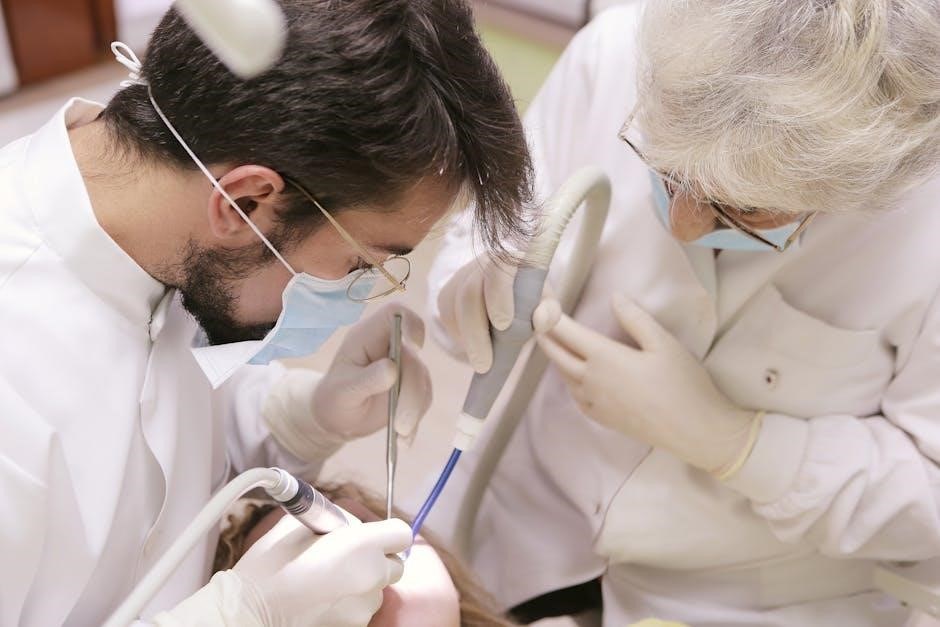
Exam Preparation Strategies
Effective strategies include creating a study plan, utilizing Q&A books, and practicing with mock tests. Focus on understanding key topics and managing time efficiently during exams.
General Tips for Success in Dental Nurse Exams
Success in dental nurse exams requires a combination of preparation and strategy. Start by understanding the exam format, including the types of questions and time limits. Practice with past papers and Q&A resources to familiarize yourself with the content. Organize your study materials, focusing on key topics like infection control, patient assessment, and dental radiography. Utilize affordable PDF guides and mock test apps to reinforce learning. Stay calm during the exam by reading questions carefully and managing your time effectively. Reviewing explanations for incorrect answers helps identify weak areas for improvement. Regular practice and continuous learning are essential for building confidence and achieving exam success. Stay updated with industry changes and exam formats to ensure readiness.
Using Q&A Books Effectively
Q&A books are invaluable tools for dental nurse exam preparation, offering practical insights and real-world scenarios. Start by identifying key topics, such as infection control and patient communication, and focus on questions related to these areas. Use books like Carole Hollins’ Q&A guide to simulate exam conditions, timing yourself to improve speed and accuracy. Review explanations carefully, even for correct answers, to deepen understanding. Prioritize questions covering high-weight exam topics, such as dental radiography and pharmacology. Regularly revisit challenging questions to reinforce learning. Track progress by noting improvements over time. Combine Q&A books with mock tests for a comprehensive study approach, ensuring readiness for the exam format and content.
Professional Development and Continuous Learning

Professional development and continuous learning are crucial for dental nurses to stay updated with industry advancements and best practices. Engaging in ongoing education ensures competence in evolving techniques and standards. Q&A resources, such as “Questions and Answers for Dental Nurses,” play a key role in this process by providing practical insights and reinforcing theoretical knowledge. Regular reviews of such materials help in identifying gaps and improving clinical skills. Additionally, participating in workshops, webinars, and professional organizations enhances networking and access to updated guidelines. Continuous learning fosters adaptability and confidence, enabling dental nurses to deliver high-quality patient care. By prioritizing professional growth, dental nurses can remain competitive and contribute effectively to modern healthcare teams. This commitment ensures long-term career success and patient satisfaction.

Types of Questions in Dental Nurse Exams
Dental nurse exams feature multiple-choice questions (MCQs), extended matching questions (EMQs), and single best answer questions, assessing knowledge, clinical reasoning, and decision-making skills effectively.
Multiple Choice Questions (MCQs)
Multiple Choice Questions (MCQs) are a primary assessment method in dental nurse exams, designed to evaluate knowledge and understanding across various clinical topics. Each MCQ presents a question with several answer options, typically including one correct response and distractors to test comprehension. They cover areas such as infection control, patient assessment, and dental radiography, ensuring candidates demonstrate both theoretical and practical knowledge. MCQs require critical thinking and application of learned concepts, making them an effective tool for measuring competency. Proper time management is essential, as these questions often form a significant portion of the exam. Practicing MCQs from resources like Q&A PDFs helps dental nurses familiarize themselves with the exam format and improve their decision-making skills.
Extended Matching Questions (EMQs)
Extended Matching Questions (EMQs) are a challenging yet effective component of dental nurse exams, requiring candidates to match multiple scenarios or statements to the most appropriate answer from a provided list. Unlike MCQs, EMQs often present a series of clinical vignettes or tasks, testing deeper knowledge and application skills. For example, questions might involve identifying appropriate infection control measures or radiographic techniques for specific patient cases. EMQs assess the ability to think critically and make accurate connections between concepts. Practicing EMQs from Q&A PDFs helps dental nurses refine their analytical skills and prepare for the exam’s demanding format. Regular practice enhances familiarity with these questions, boosting confidence and performance.
Single Best Answer Questions
Single Best Answer (SBA) questions are a common format in dental nurse exams, designed to test precise knowledge and decision-making skills. These questions present several options, but only one is correct. SBAs often focus on clinical scenarios, patient care protocols, or technical procedures, requiring the candidate to select the most appropriate action or fact. For example, questions might ask about the correct procedure during a dental emergency or the best way to handle patient records. Practicing SBAs from Q&A PDFs helps dental nurses develop the ability to identify the most accurate response quickly. Regular practice enhances familiarity with the format and improves confidence in making informed decisions under exam conditions.
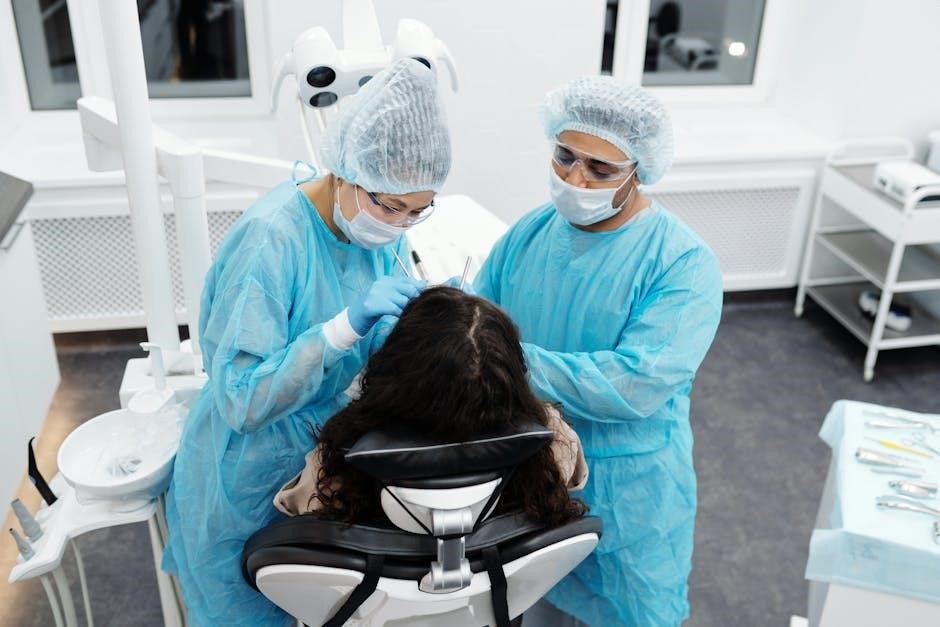
Essential Topics in Dental Nursing

Essential topics in dental nursing cover infection control, patient assessment, dental radiography, pharmacology, and anesthesia. These areas are crucial for providing safe, effective patient care.
Infection Control and Prevention
Infection control and prevention are fundamental in dental nursing to ensure patient and staff safety. Dental nurses must adhere to strict protocols, including the use of personal protective equipment (PPE), proper hand hygiene, and surface disinfection. Understanding sterilization techniques for instruments is critical to prevent cross-contamination. Additionally, dental nurses should be knowledgeable about waste management and sharps handling to minimize infection risks. Familiarity with guidelines from organizations like the Centers for Disease Control and Prevention (CDC) and local health authorities is essential. Effective infection control measures not only protect patients but also maintain a safe working environment, making this a cornerstone of dental nursing practice.
Patient Assessment and Communication
Patient assessment and communication are vital skills for dental nurses, ensuring personalized care and positive outcomes. A thorough assessment involves evaluating the patient’s medical history, vital signs, and specific dental needs. Effective communication builds trust and understanding, helping patients feel at ease. Dental nurses should use clear, empathetic language to explain procedures, address concerns, and provide reassurance. Active listening is crucial to identify patient anxieties or underlying health issues. Good communication also facilitates accurate record-keeping and collaboration with the dental team. By fostering open dialogue, dental nurses can tailor care to individual needs, ensuring a positive experience and optimal treatment results.
Dental Radiography and Imaging
Dental radiography and imaging are essential diagnostic tools in dental care, enabling the detection of hidden dental issues. Common imaging techniques include intraoral X-rays (e.g., bitewing, periapical) and extraoral X-rays (e.g., panoramic, cephalometric). Dental nurses play a key role in preparing patients, positioning them correctly, and operating imaging equipment safely. Proper radiation safety measures, such as using lead aprons and thyroid collars, are crucial to minimize exposure. Accurate imaging helps dentists diagnose conditions like tooth decay, abscesses, and bone loss. Dental nurses must understand the purpose of each radiograph, ensure image quality, and maintain patient records. Proficiency in radiography enhances diagnostic accuracy and supports effective treatment planning, making it a fundamental skill for dental nurses;
Pharmacology and Anesthesia
Pharmacology and anesthesia are vital components of dental nursing, focusing on the safe administration of medications and anesthetics. Dental nurses must understand the types of local anesthetics, sedation methods, and pain management drugs commonly used in dental procedures. Key topics include pharmacokinetics, pharmacodynamics, and potential drug interactions. Anesthesia administration requires precise dosing and monitoring to ensure patient safety. Dental nurses also play a crucial role in managing emergencies, such as allergic reactions or anaphylaxis. Understanding the effects of medications on various patient groups, like children or elderly individuals, is essential. Proper handling and storage of anesthetic agents are critical to prevent complications. This knowledge ensures dental nurses can assist effectively during procedures and provide optimal patient care.

Managing Exam Challenges
Effective strategies include time management, prioritizing questions, and staying calm. Practice mock tests to build confidence and adapt to exam pressures. Focus on understanding key concepts thoroughly.
Time Management During the Exam
Effective time management is crucial for success in dental nurse exams. Allocate a set amount of time to each question, ensuring you cover all sections. Start with questions you find easier to build confidence. Skim through the entire paper first to identify straightforward questions. Divide your time based on the number of questions and their difficulty. Practice mock tests under timed conditions to improve speed and accuracy. Avoid spending too long on a single question—move on and return if time permits. Use strategies like the SWOT technique (Strengths, Weaknesses, Opportunities, Threats) to prioritize your answers. Proper time management reduces stress and allows you to showcase your knowledge effectively.
Handling Difficult Questions
When encountering challenging questions during dental nurse exams, remain calm and methodical. Start by carefully reading the question to understand what is being asked. Eliminate obviously incorrect answers first to narrow down your options. Look for keywords or clues in the question stem that might guide you to the correct answer. If unsure, make an educated guess based on your knowledge. Avoid overcomplicating the question—sometimes the answer is more straightforward than it seems. Use the process of elimination to increase your chances of selecting the right answer. Prioritize questions you find easier and return to difficult ones later. Practice with mock tests to improve your ability to handle tough questions confidently and effectively.
Strategies for Reducing Exam Anxiety
To reduce exam anxiety, dental nurse candidates should adopt a proactive approach to preparation. Deep breathing exercises and positive visualization can help calm nerves before and during the exam. Regular physical activity and a balanced diet also contribute to mental well-being. Establishing a consistent study routine and breaking down material into manageable sections can reduce feelings of overwhelm. Utilizing Q&A resources, such as dental nurse exam PDFs, allows candidates to familiarize themselves with question formats and content, boosting confidence. Additionally, setting realistic goals and celebrating small achievements can help maintain motivation. Prioritizing sleep and staying hydrated are essential for optimal brain function. By focusing on holistic well-being, candidates can approach exams with clarity and confidence, ensuring their best performance.
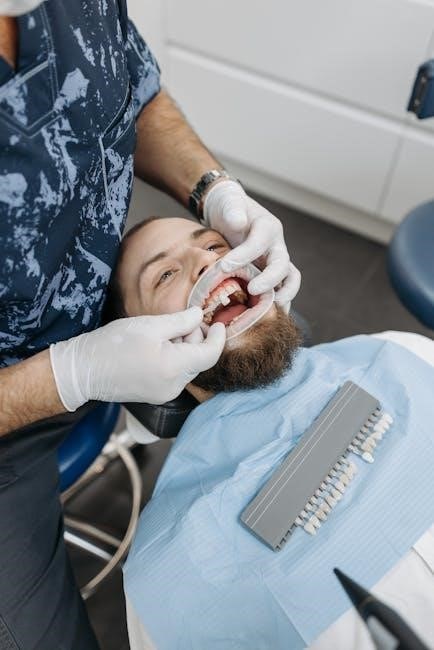
Mock Tests and Practice Exams
Mock tests and practice exams simulate real exam conditions, helping dental nurses assess their knowledge and identify improvement areas. They enhance problem-solving skills and build confidence using Q&A resources like dental nurse PDFs.
Benefits of Mock Tests for Dental Nurses
Mock tests provide dental nurses with practical exam experience, enhancing their preparation and confidence. They simulate real-time conditions, helping nurses manage time effectively and reduce anxiety. By practicing with questions and answers from dental nurse PDFs, candidates familiarize themselves with exam formats, such as MCQs and EMQs. Mock tests also reveal strengths and weaknesses, allowing targeted study. Regular practice improves critical thinking and problem-solving skills, essential for success. Additionally, mock tests foster a deeper understanding of key topics, ensuring nurses are well-prepared for the actual exam. Using these tools alongside Q&A resources maximizes learning outcomes and builds proficiency in handling diverse clinical scenarios. Regular mock tests are a cornerstone of effective dental nurse exam preparation.
How to Analyze Your Mock Test Results
Analyzing mock test results is crucial for identifying areas needing improvement. Start by reviewing correct and incorrect answers to understand mistakes. Focus on weak subjects or recurring errors, such as infection control or radiography questions. Create a study plan targeting these gaps, using dental nurse PDF resources for further clarification. Track progress by retaking tests and comparing scores. Pay attention to time management and question types, like MCQs or EMQs, to refine exam strategies. This systematic approach ensures focused learning, boosts confidence, and enhances overall performance. Regular analysis of mock test results helps dental nurses refine their knowledge and skills effectively, ensuring readiness for the actual exam.
Using Mock Tests to Improve Weak Areas
Mock tests are invaluable for identifying and addressing weak areas in dental nurse exam preparation. After taking a test, review incorrect answers to pinpoint gaps in knowledge. Focus on topics like infection control or pharmacology, where mistakes frequently occur. Use dental nurse PDF resources, such as Carole Hollins’ Q&A, to deepen understanding of these areas. Retake mock tests to reassess progress and adjust study plans accordingly. Prioritize weak subjects and allocate more time to mastering them. By systematically addressing these gaps, dental nurses can build confidence and ensure a comprehensive grasp of essential topics. Regular practice and targeted improvement strategies lead to better exam performance and long-term success.
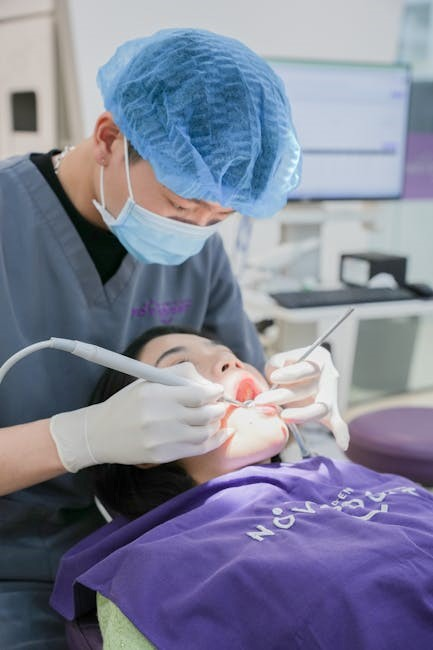
Future Trends in Dental Nursing
Digital dentistry, AI, and eco-friendly practices are reshaping dental nursing. Online learning and specialized courses enhance education. Patient-centered care and advanced technologies improve treatment outcomes and efficiency, ensuring sustainable growth in the field.
Advancements in Dental Nursing Education
Recent advancements in dental nursing education emphasize interactive and technology-enhanced learning. Virtual reality simulations now allow trainees to practice clinical procedures in lifelike environments. Online platforms provide flexible access to courses, enabling nurses to study at their own pace. Hybrid learning models combine in-person sessions with digital resources, improving engagement. AI-driven tools offer personalized feedback and adaptive learning paths. Additionally, integrated case studies and real-world scenarios are being incorporated to enhance practical understanding. These innovations ensure dental nurses are better prepared to meet modern patient needs and stay updated with industry standards. Continuous professional development is also encouraged through regular updates in course materials. This evolution in education equips dental nurses with the skills and confidence to excel in their roles.
Emerging Technologies in Dental Care
Emerging technologies in dental care are transforming the field, offering advanced tools for diagnosis, treatment, and patient care. CAD/CAM systems enable precise digital impressions and restorations, while intraoral scanners provide high-resolution 3D images for accurate treatment planning. 3D printing is revolutionizing the creation of dental prosthetics, implants, and orthodontic appliances. Artificial intelligence (AI) is being used for early detection of oral diseases, such as caries and cancer, improving diagnostic accuracy. Digital radiography and cone beam CT scans enhance imaging capabilities, reducing radiation exposure. These technologies not only improve patient outcomes but also streamline workflows, allowing dental nurses to focus on providing high-quality, efficient care. Staying updated on these advancements is essential for dental nurses to deliver modern, evidence-based practices.
Role of Dental Nurses in Modern Healthcare
Dental nurses play a vital role in modern healthcare, serving as essential members of the dental team. Their responsibilities include assisting dentists during procedures, maintaining patient records, and ensuring infection control protocols are followed. They also prepare patients for treatments, provide post-operative care instructions, and manage dental materials. Additionally, dental nurses often handle administrative tasks, such as scheduling appointments and managing supplies. Their role extends to patient education, offering guidance on oral hygiene and preventive care. By supporting both clinical and administrative functions, dental nurses contribute to efficient healthcare delivery and improved patient outcomes. Their professionalism and expertise are crucial in maintaining high standards of dental care in modern healthcare settings.
Success in dental nurse exams requires thorough preparation, consistent practice, and staying updated with industry standards. Utilize Q&A resources, mock tests, and continuous learning to excel and confidently ace your exams.
Final Tips for Dental Nurse Exam Success
To achieve success in dental nurse exams, focus on understanding key concepts rather than rote learning. Practice with timed mock tests to improve speed and accuracy. Review and master infection control, patient assessment, and radiography, as these are frequently tested areas. Utilize Carole Hollins’ Q&A book to familiarize yourself with exam-style questions. Stay calm during the exam, read each question carefully, and eliminate incorrect options before selecting your answer. Continuous learning and staying updated with industry guidelines will enhance your confidence and performance. Lastly, seek feedback from mock tests to address weak areas and refine your strategy for optimal results.
Staying Updated with Industry Changes
Staying updated with industry changes is crucial for dental nurses to maintain high standards of patient care and pass exams confidently. The dental field evolves rapidly, with advancements in technologies, treatments, and guidelines. Regularly reviewing updates from professional bodies like the British Dental Association and the General Dental Council ensures you stay informed. Subscribing to dental journals, attending webinars, and participating in continuing professional development (CPD) courses are effective ways to keep your knowledge current. Additionally, following reputable dental nursing forums and groups can provide insights into emerging trends. By staying updated, you not only enhance your clinical skills but also prepare for exam questions that reflect the latest practices in dental nursing.
Continuous Learning and Professional Growth
Continuous learning and professional growth are essential for dental nurses to excel in their careers and remain competent in their roles. The dental nursing profession requires ongoing education to adapt to new techniques, technologies, and patient care standards. Engaging in regular training, workshops, and courses ensures that dental nurses stay updated and skilled; Professional growth also involves reflecting on personal development and seeking feedback to improve. By committing to lifelong learning, dental nurses can enhance their clinical skills, broaden their career opportunities, and contribute effectively to patient care. Investing time in continuous learning demonstrates dedication to the profession and ensures long-term success in both clinical practice and exam preparation.
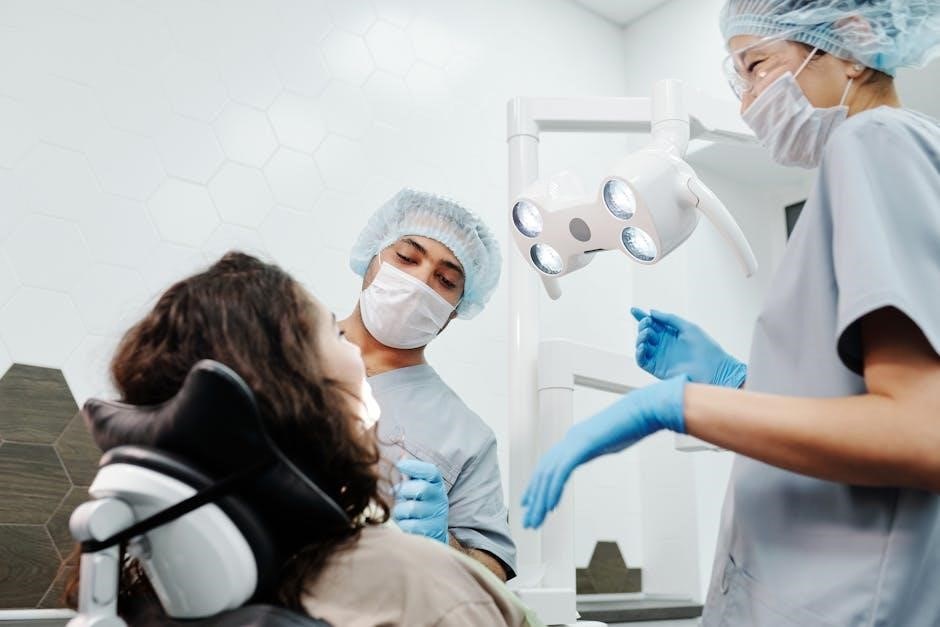



About the author